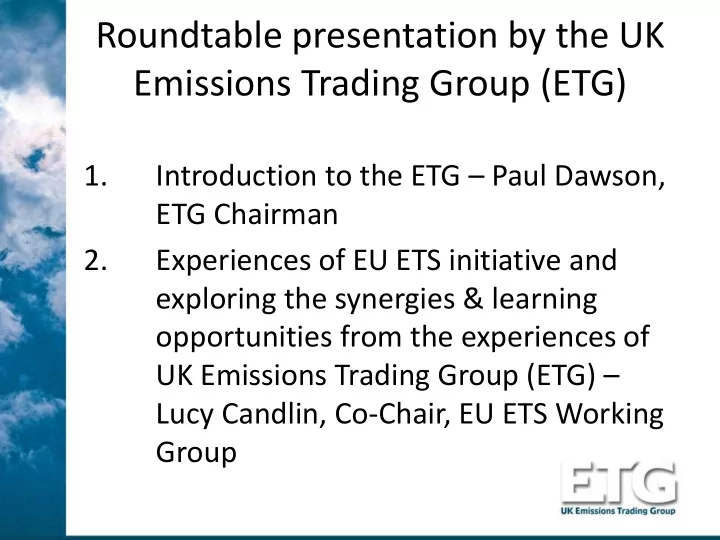

Roundtable presentation by the UK Emissions Trading Group (ETG) 1. Introduction to the ETG – Paul Dawson, ETG Chairman 2. Experiences of EU ETS initiative and exploring the synergies & learning opportunities from the experiences of UK Emissions Trading Group (ETG) – Lucy Candlin, Co-Chair, EU ETS Working Group
ETG history and approach… • ETG formed July 1999 by the CBI and ACBE • Made proposals for UK ETS • Originally 30 organisations • 25 March 2004 – ETG Ltd • Now some 60 subscribing members – high proportion of UK emissions in EU ETS - industry, service providers, trade associations. • We are not a lobbying organisation - we work closely with Government at the formative stages of decision making - initially on UK ETS and subsequently on EU ETS + UK Domestic Schemes (CRC, CCA and EED/ESOS) - and submit papers to UK Government
How ETG is structured EU WG • EU ETS including monitoring, reporting, verification and accreditation Domestic Measures WG • UK Schemes – CRC Energy Efficiency Scheme; Climate Change Agreements + • Energy Savings Opportunities Scheme (ESOS)/Energy Efficiency Directive/energy efficiency audits • + ‘better regulation - Government Business Energy Efficiency Review Consultation – policy and reporting Various adhoc Subgroups • e.g. Technical MRV, data, carbon leakage, International Aviation & Shipping
Experiences of EU ETS initiative and exploring the synergies & learning opportunities from the experiences of UK Emissions Trading Group (ETG) Roundtable Discussion to foster UK-India partnership for promoting Industrial Energy Efficiency 28 September 2016 - London
Presentation outline 1. Broad principles of Energy Efficiency 2. Issue of Overlapping Policies 3. Energy Efficiency in the EU ETS
1.1 Broad principles of Energy Efficiency Energy Efficiency has a key role to play in global sustainable development and energy policy. Energy Efficiency contributes by: • Affordability because less energy is needed; on • Security because it reduces dependence on imports; and on • Sustainability because it reduces GHG and other associated emissions (e.g. particulates, odours)
1.2 Broad principles of Energy Efficiency Thus Policy makers see energy efficiency as a major opportunity to mitigate climate change. The IEA estimates that energy efficiency could contribute about half of the emission reductions required by 2030 to stay on track for 2 ⁰ C. However, there can be inefficiencies in Energy Efficiency regulation if too specific
2.1 Issue of Overlapping EE/ETS Policies • Typically Energy Efficiency (EE) regulation mandates use of technology and/or emissions levels at installation level with little regard to costs. • But an ETS can deliver GHG reductions at the lowest cost across the economy. • Energy efficiency measures are encouraged anyway in an ETS: almost all ETS emissions are combustion related. So greater energy efficiency means savings on fuel use
2.2 Issue of Overlapping EU ETS Policies • Energy Efficiency regulation for industry can be disruptive to ETS installations: – If reductions are specifically prescribed for energy efficiency – When the ETS market price is indicating cheaper measures to reduce GHG emissions under the cap – Can over-value energy efficiency compared to other investment opportunities – e.g. marketing, customer service, debottlenecking
2.3 Issue of Overlapping EU ETS Policies • Energy Efficiency (EE) regulation should be first evaluated for coverage in the EU ETS • Where EE regulation is too prescriptive on ETS installations, it should be amended. – This to reduce the economic damage and free trade agreements • ETG members generally prefer flexibility in meeting an ETS cap (i.e. reduce or purchase allowances) rather than have rigid limits and targets for energy efficiency that increase policy cost.
2.3 Example of an Overlapping ETS Policy: EU Energy Efficiency Directive (EED) • What EED Article 7 says… • Implemented through one or a combination of national efficiency − Each MS must achieve a obligation schemes or alternative cumulative end-use energy policy measures savings target • Savings can be reduced by 25% by… − 1.5% saving p/a of the annual − Using lower savings rates energy sales to final customers of all energy distributors and retailers − Partially or fully excluding ETS − Sales of energy used in transport industries may be partially or fully excluded − Counting certain energy savings from this calculation from energy transformation and − All by 31 December 2020 transmission sectors − Counting energy savings from early action since 2008 that still deliver 11 an impact in 2020
3. Energy Efficiency treatment in EU ETS Under EU ETS Article 26, where an installation is subject to EU ETS, its IPPC* permit shall not include an emission limit value. This done by amending the IPPC Directive to prevent regulators forcing reductions and thus reducing compliance flexibility emissions over and above those required by the EU ETS cap. However, the Commission then developed the Energy Efficiency Directive…… * DIRECTIVE 96/61/EC of 24-09-1996 concerning integrated pollution prevention & control – IPPC
3. EU ETS Article 26 -Text Article 26 - Amendment of Directive 96/61/EC In Article 9(3) of Directive 96/61/EC the following subparagraphs shall be added: ‘Where emissions of a greenhouse gas from an installation are specified in Annex I to Directive 2003/87/EC of the European Parliament and of the Council of 13 October 2003 establishing a scheme for greenhouse gas emission allowance trading within the Community and amending Council Directive 96/61/EC (*) in relation to an activity carried out in that installation, the permit shall not include an emission limit value for direct emissions of that gas unless it is necessary to ensure that no significant local pollution is caused. For activities listed in Annex I to Directive 2003/87/EC, Member States may choose not to impose requirements relating to energy efficiency in respect of combustion units or other units emitting carbon dioxide on the site. DIRECTIVE 96/61/EC of 24-09-1996 concerning integrated pollution prevention & control – IPPC
Thank you for your Attention Co-Chair EU Working Group, UK ETG Secretariat: John.Craven@etg.uk.com UK Emissions Trading Group (UK ETG)
Recommend
More recommend